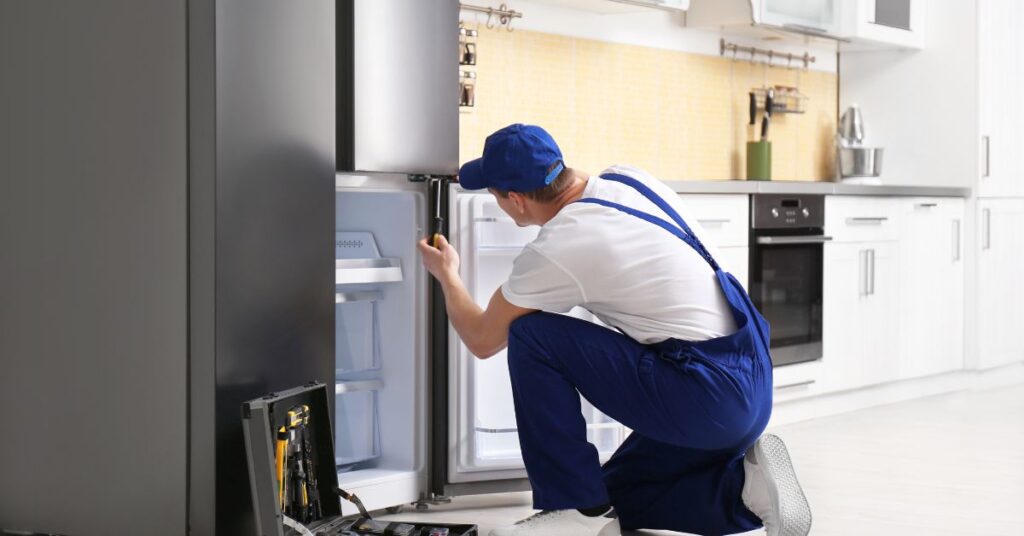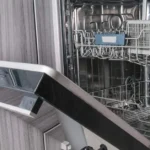A refrigerator leaking water can disrupt daily life, whether you’re a homeowner in Niceville area or a property manager, especially if water is pooling around the appliance. Puddles inside the fridge or on the floor can spoil food, damage hardwood, or raise concerns during a home inspection along Florida’s Emerald Coast, often indicating a water leak. In these areas, where humidity often exceeds 70%, leaks are a frequent issue due to increased condensation, making it essential to monitor the fridge water levels. These problems can lead to costly repairs or delays in property sales if not addressed promptly.
In this guide, we will explore the reasons behind a water leak, provide practical cleaning steps, and clarify when professional refrigerator repair service In Niceville is necessary to keep your refrigerator safe and reliable, especially for properties where appliance performance impacts tenant satisfaction and home value.
How Refrigerator Leaks Occur?
Refrigerators rely on systems like cooling coils, defrost drains, and water lines to maintain temperature and manage moisture. When these components malfunction, you may notice fridge leaking water, either inside the compartments or pooling on the floor. In Niceville’s humid environment, high moisture levels accelerate condensation, putting extra strain on drain systems and seals.
For homeowners, leaks can increase energy costs or damage kitchen floors. For realtors and property managers, a leaking fridge is a signal for appliance issues, making a property less appealing to buyers or tenants. Common culprits include clogged drains, faulty seals, or water line problems.
Understanding these causes helps you troubleshoot effectively, especially when your fridge is leaking. Below, we detail the most common reasons for leaks and how to fix them, with practical tips tailored to Florida’s coastal conditions.
Common Reasons for Refrigerator Leaks and Their Fixes
Blocked Defrost Drain
A blocked defrost drain is a frequent cause of fridge leaking water inside, and you may need a baster to flush warm water through it. The defrost drain, typically located behind the fridge’s rear panel, channels melted frost from the evaporator coils (the cooling elements inside your fridge) to a drain pan. Food debris, ice, or mold can clog this tube, causing water to pool inside the fridge or spill onto the floor.
In humid climate, frequent defrost cycles due to high moisture levels make clogs more likely, especially in busy households or rental properties.
- How to Fix: Identify the common causes of refrigerator leaks to effectively address the issue. Unplug the refrigerator for safety. Find the drain (check your owner’s manual for its exact location, usually near the evaporator coils). Use a turkey baster to flush the drain with warm water or a 1:1 vinegar-water solution to dissolve debris and prevent a leaky refrigerator. For stubborn blockages, gently insert a pipe cleaner, taking care not to damage the tube. Clean the drain every six months to prevent clogs, particularly for property managers maintaining rentals in Niceville. If the blockage persists, a professional can use specialized tools to clear it without harming the fridge, ensuring the drain hole is unobstructed.
- Why It Matters: Checking the water levels and ensuring proper maintenance can help prevent leaks. A clear drain prevents water damage to floors, a major concern for homeowners. For realtors, ensuring appliances function properly avoids buyer concerns during property showings, supporting smoother sales.
- Additional Tips to fix this problem effectively: In Florida’s humid climate, mold can grow in drains. Adding a teaspoon of baking soda to the vinegar flush can help eliminate odors and prevent buildup. For older fridges, check the drain tube material, as plastic tubes may crack over time, requiring replacement.
Frozen Water Supply Line
If you notice water under refrigerator and your ice maker isn’t working, a frozen water supply line may be the issue. This line delivers water to the ice maker or dispenser, but in Niceville’s humid conditions, evaporator coils can overcool, freezing the line and causing leaks. This problem is common in vacation rentals where fridges are heavily used, or in older models with less efficient cooling systems, increasing the risk of a leaking refrigerator.
- How to Fix: Unplug the fridge and locate the water line, typically behind the freezer compartment. Defrost it by turning off the fridge for 8–12 hours, placing towels to catch melting water. Alternatively, use a hairdryer on low, keeping it 6–8 inches away to avoid damaging components. Set the fridge to 40°F or below, per FDA food safety guidelines, to prevent refreezing. If the line is damaged or coolant-related issues are suspected, a technician can diagnose safely, ensuring all potential causes of refrigerator leaks are considered, including checking the water supply.
- Why It Matters: A frozen line disrupts ice production, inconveniencing homeowners or tenants. For real estate professionals, a fully functional ice maker enhances a property’s appeal, avoiding delays in sales or rentals.
- Additional Tips: Check the fridge’s temperature settings monthly, as settings below 35°F can increase freezing risks. For rentals, educate tenants on proper fridge use to avoid overloading, which can strain cooling systems and cause freezes that lead to water leaking.
Worn Door Gasket

A worn or dirty door gasket, the rubber seal lining the fridge door, allows humid air to enter, leading to condensation and fridge leaking water. In this warm, humid climate, gaskets wear out faster due to frequent use and moisture exposure. A weak seal reduces cooling efficiency, raising energy bills and potentially signaling appliance issues during home inspections.
- How to Fix: Test the gasket by closing the door on a dollar bill. If it slides out easily, the seal is weak. Clean the gasket with warm, soapy water to remove dirt or mold, common in humid homes. If torn or loose, order a replacement gasket specific to your fridge model (check the manual or manufacturer’s website) to ensure the refrigerator door seals properly. Inspect gaskets monthly, especially in rental properties, to maintain performance.
- Why It Matters: A tight seal keeps energy costs low for homeowners in Niceville and ensures appliances meet buyer expectations during property sales, especially if the fridge water system is functioning properly. A reliable fridge strengthens tenant satisfaction in rental units, reducing maintenance complaints.
- Additional Tips: Apply a thin layer of petroleum jelly to the gasket after cleaning to improve its seal and extend its lifespan. For realtors, include gasket checks in pre-listing inspections to avoid surprises during buyer walkthroughs.
Cracked or Overflowing Drain Pan
The drain pan, located at the bottom or back of the fridge, collects water from the defrost cycle. If it’s cracked or overflows, you’ll see why is my fridge leaking water onto the floor. In Niceville’s humid summers, drain pans fill quickly due to frequent defrosting, and wear over time can cause cracks, especially in older fridges common in rental properties, leading to a leaking refrigerator.
- How to Fix: Unplug the fridge and locate the pan, often behind a lower panel (remove with a screwdriver). Empty and clean it with soapy water to remove debris or mold. Inspect for cracks; if damaged, replacements are affordable, typically $30–$50. Check the pan monthly during Florida’s humid season, especially in high-traffic rentals, to prevent overflow.
- Why It Matters: A functional drain pan protects floors, a key concern for homeowners. For property managers, addressing pan issues ensures tenant comfort and maintains property value during inspections.
- Additional Tips: Place a shallow tray under the fridge to catch minor overflows in humid months. For older models, consider upgrading to a fridge with a larger drain pan to handle Florida’s climate better.
High Humidity in Florida’s Climate
High humidity, common across the Emerald Coast, contributes to why refrigerator leaks water. Opening the fridge door allows humid air to enter, which condenses and overwhelms the drain pan, causing leaks. In Niceville, where summer humidity can reach 80%, this issue is prevalent, especially in homes without proper ventilation, contributing to common causes of refrigerator leaks.
- How to Fix: Empty the drain pan regularly, as described above. Install a kitchen dehumidifier to reduce moisture levels. Maintain the fridge at 40°F to balance cooling and minimize condensation. Monthly checks during summer ensure the pan doesn’t overflow, especially in rental properties.
- Why It Matters: Controlling humidity prevents leaks and extends fridge lifespan, saving money for homeowners by reducing the need to replace the water line. For realtors, a leak-free fridge enhances a property’s marketability, avoiding buyer concerns during showings.
- Additional Tips: Use a hygrometer to monitor kitchen humidity, aiming for 50–60% to reduce condensation. For vacation rentals, educate tenants on closing the fridge door quickly to minimize humid air entry, which can exacerbate water leak issues.
Faulty Water Dispenser or Ice Maker
A malfunctioning water dispenser or ice maker often causes how to fix refrigerator leaking water, particularly after filter changes or new installations, leading to water pooling. Air trapped in the water line or a loose filter connection can lead to drips, common in modern fridges. These issues can frustrate tenants or signal appliance problems during property sales, particularly if the refrigerator is leaking water.
- How to Fix: Run the dispenser for 2–3 quarts of water to clear air pockets. Verify the water filter is securely installed, following your fridge’s manual. Inspect the water line or dispenser switch for damage, which may require professional attention. Regular filter changes every 6 months prevent leaks, especially in high-use rentals.
- Why It Matters: A working dispenser or ice maker improves tenant satisfaction in rental properties and enhances buyer appeal during home sales. Reliable appliances reduce maintenance calls for property managers.
- Additional Tips: Keep spare filters on hand, ensuring they match your fridge model to avoid installation errors. For realtors, highlight working dispensers in property listings to showcase appliance functionality.
Preventive Maintenance for a Leak-Free Refrigerator
Regular maintenance prevents fridge leaking water and ensures your refrigerator operates efficiently, whether you’re a homeowner or a property manager. Proactive care reduces repair costs, lowers energy bills, and keeps appliances reliable for home sales or rentals. Here are detailed steps to maintain your fridge:
- Clean the defrost drain every six months with a vinegar-water solution to prevent clogs, using a turkey baster to flush warm water for easy flushing.
- Inspect door gaskets monthly, cleaning with soapy water and checking for wear to maintain a tight seal, especially in humid homes.
- Empty the drain pan during humid seasons (June–September) to avoid overflow, particularly in rentals with heavy fridge use, as a leaking refrigerator can lead to significant issues.
- Monitor fridge temperature monthly, keeping it at 40°F or below to balance cooling and reduce condensation risks.
- Check water filters every six months, replacing them to ensure proper function in dispensers and ice makers.
- Vacuum the condenser coils (behind or under the fridge) annually to remove dust, improving cooling efficiency and preventing overcooling.
A realtor recently avoided a sale delay by addressing a minor drain clog before an open house, ensuring the fridge performed flawlessly. - Place a thermometer inside the fridge to verify consistent temperature, adjusting as needed to avoid frost buildup inside the freezer.
- Organize fridge contents to ensure proper airflow, preventing overcooling that can lead to leaks and potential water on the floor.
- For rentals, provide tenants with a simple maintenance checklist to reduce wear on appliances and prevent water on the floor.
Reliable Repairs with Beach2Bay Appliances
Refrigerator leaks, whether from clogged drains or humid air, can disrupt your home or complicate property sales in Niceville, especially if the reason why your refrigerator is leaking water isn’t addressed. Addressing issues like why refrigerator leaks water with the solutions above protects your floors, groceries, and property value. Beach2Bay Appliance repair service offers mobile, on-site repairs, with clear pricing and expertise in real estate needs. A property manager noted, “A quick fix from Beach2Bay resolved a fridge leak, keeping our tenants happy and our property competitive.” For dependable service, Contact Beach2Bay Appliances to Schedule Your Refrigerator Repair Service.
Answers to Common Refrigerator Leak Questions
How do I get my fridge to stop leaking water?
To stop fridge leaking water, identify the source: check for a clogged defrost drain, frozen water line, or worn gasket, as small amounts of water may be leaking from the bottom of the refrigerator. Flush the drain with warm water, defrost the line, or clean the gasket. Regular maintenance, like cleaning drains every six months, prevents leaks in Niceville’s humid homes.
Why is my fridge leaking from the bottom onto the floor?
Cracked drain pans or frozen water lines are common culprits. Empty and inspect the pan for cracks, and defrost the line if needed. Monthly checks in rentals prevent overflow during humid months.
Why would a refrigerator drip water inside?
One reason could be a malfunctioning valve. A clogged defrost drain or faulty door gasket often causes drips. Flush the drain with vinegar and water, and test the gasket with a dollar bill. Regular cleaning keeps fridges in your homes leak-free.
How do I stop my refrigerator water line from leaking, especially if small amounts of water are pooling?
To stop how to stop a fridge from leaking water from the water line, run the dispenser for 2–3 quarts to clear air. Check the filter and line connections for security. For persistent leaks in your homes, a professional can inspect for damaged water lines or other issues.
How does Florida’s humidity impact my fridge?
High humidity in Niceville increases condensation, overwhelming drain pans. Empty pans regularly and use a dehumidifier to maintain performance in Florida’s coastal climate, especially for beach rentals.
Do refrigerator water lines need to be replaced?
Lines may need replacement if cracked or worn, often after 5–10 years. Inspect annually for wear. A professional appliance repair service in Niceville is necessary to perform this action with proper safety.
Author Profile
- John Raymond Hagler
- Beach2Bay Appliances is a trusted name in Florida for professional appliance repair services. Serving homeowners, realtors, and property managers, our experienced team focuses on reducing costly breakdowns and maximizing appliance efficiency. Committed to reliability, transparency, and customer care, we help maintain the value and functionality of homes and rental properties through routine service and urgent repairs.
Latest entries
 BlogsAugust 30, 2025Oven Smells Like Burning While Cooking? Here’s the Solution
BlogsAugust 30, 2025Oven Smells Like Burning While Cooking? Here’s the Solution BlogsAugust 29, 2025Why Your Dishwasher Isn’t Cleaning Dishes and How to Fix It
BlogsAugust 29, 2025Why Your Dishwasher Isn’t Cleaning Dishes and How to Fix It BlogsAugust 29, 20257 Reasons Your Microwave Isn’t Working and How to Fix It Quick
BlogsAugust 29, 20257 Reasons Your Microwave Isn’t Working and How to Fix It Quick BlogsAugust 27, 2025Why Your Refrigerator Isn’t Cooling and How to Fix It
BlogsAugust 27, 2025Why Your Refrigerator Isn’t Cooling and How to Fix It
